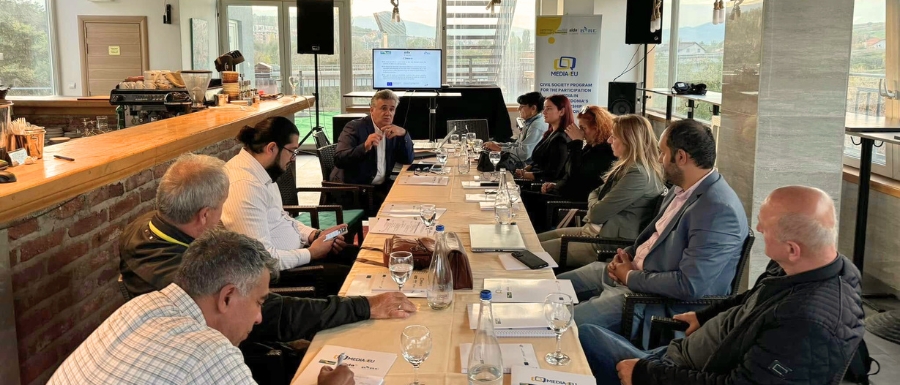As part of the Media4EU project, carried out by ALDA, Eurothink, and BIRC, eight thematic forums were organised across North Macedonia’s eight administrative planning regions. These forums served as a collaborative platform for journalists, civil society representatives, and experts from diverse fields to come together and engage in meaningful discussions.
Each forum focused on region-specific topics, such as consumer rights, the free movement of workers, agriculture, ethnic group rights, education policies, transport policies, fisheries, and environmental issues. The events took place in Skopje, Shtip, Strumica, Kumanovo, Bitola, Veles, Ohrid, and Tetovo, all of which are cities in North Macedonia, with renowned experts and trainers facilitating the discussions. These forums offered an excellent opportunity for the exchange of ideas and a more in-depth exploration of local concerns.
Veles Forum: Aligning Transport Policies with European Standards
At the thematic forum in Veles, participants discussed the importance of transport policies in alignment with European standards, as well as the need for improved communication between the media and local authorities. Throughout the event, ideas were exchanged on how to enhance the flow of information between departments responsible for public relations in local institutions, with the aim of fostering more interactions between journalists and the civil sector.
Strumica Forum: Promoting EU Funding and Agricultural Awareness
Likewise, at the thematic forum in Strumica, participants were engaged in debates and discussions. They advocated for stronger collaboration between media outlets, NGOs, and local authorities to promote EU funding opportunities, raise awareness of agricultural policies, and encourage farmers to actively participate in these initiatives.
Ohrid Forum: Tackling Fisheries and Environmental Challenges
The Ohrid forum focused on the challenges confronting fisheries and the environment. Speakers examined the current situation of fisheries in North Macedonia and highlighted the pressing need for effective communication regarding EU funding opportunities. Participants also underscored the importance of cross-border cooperation and the role of the media in raising public awareness of these vital issues.
Shtip Forum: Addressing Labour Law and Workers’ Rights
In Shtip, media representatives and civil society organisations gathered to discuss labour law and workers’ rights. The discussions focused on the challenges of labour shortages caused by youth emigration and broader demographic trends across Europe. While North Macedonia’s labour laws largely align with EU standards, the forum highlighted shortcomings in their implementation and enforcement. The conversations resulted in recommendations for new legislation on labour disputes and collective bargaining, drawing on Austrian examples, as well as calls for stronger non-discrimination policies and the ratification of pertinent international conventions.
Bitola Forum: Advancing Education, Culture, and Youth Development
The forum in Bitola focused on education, culture, and youth development within the framework of North Macedonia’s European integration. Key discussions centred on aligning domestic legislation with EU standards, especially concerning the Erasmus+ programme and cultural initiatives. Participants engaged in meaningful dialogues on educational policies, media communication strategies, and the need for increased investment in the youth and cultural sectors. The forum also acknowledged the changing role of both social and traditional media in public discourse, providing valuable insights for future policy development aimed at aligning the country’s educational and cultural practices with European standards.
Overall, the Media4EU initiative has greatly increased awareness and strengthened capacity within North Macedonia’s media and civil society sectors, offering essential support for the country’s journey towards European integration. Through these thematic forums, the project has effectively facilitated continuous dialogue between civil society, media, and government bodies. The insights and recommendations gathered from these discussions will play a key role in shaping future strategies to promote regional development and encourage collaboration. As the project progresses, it remains dedicated to ensuring that local voices are heard and included in the broader European conversation, working towards a future where regional challenges are addressed through collective action and shared knowledge.
